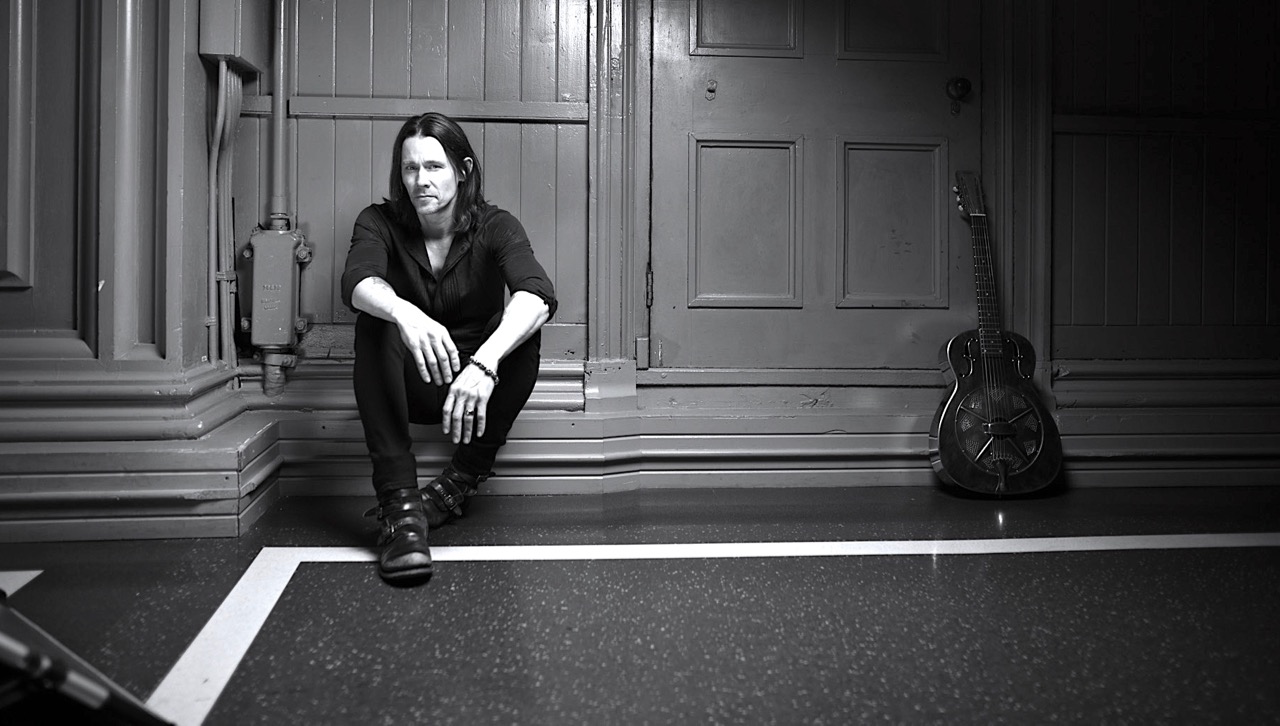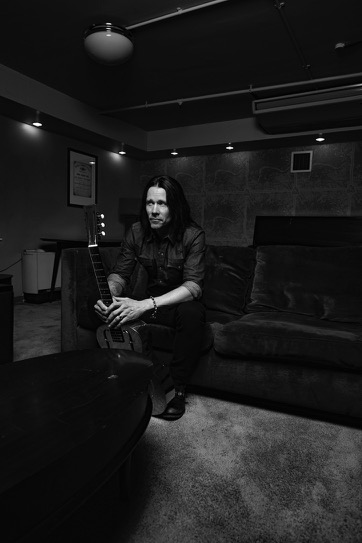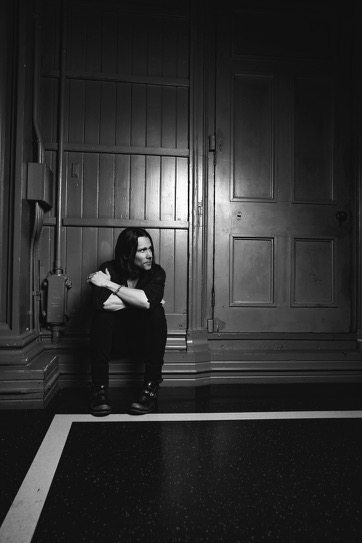MYLES KENNEDY – “If There Is A God, Why Did This Happen?”
March 8, 2018, 6 years ago

“I don’t know if I realized as I began the process, what a unique situation it was,” says Myles Kennedy, referring to Year Of The Tiger, his debut solo album, available March 9th via Napalm Records. “Once I jumped in and decided to tackle it… when it was all said and done, it ended up being a real cathartic, good experience. Hopefully as people listen to it, and discover it, it’ll have a place and meaning in their life as well. That’s all you can hope for as an artist.”
Known around the globe as the frontman for Alter Bridge and Slash, with Year Of The Tiger, Myles Kennedy has crafted a beautiful, melancholic, and above all else, very personal 12-song set. According to the Chinese zodiac, 1974 was the Year Of The Tiger, and in that year – when he was only four years old – Myles suffered the loss of his father. Now, he’s written a sombre and touching album about that tragedy.
As this year goes on, and Kennedy performs songs from Year Of The Tiger live on tour, it’s bound to rekindle the memory of his Dad’s passing, which could be quite painful. “I think to some degree, there’s always going to be… as I’m performing some of these songs, there’s always going to be an emotional connection that might be challenging. But, one thing I’ve learned – especially through some of the songs in the Alter Bridge catalogue, like ‘Black Bird’ or ‘Wonderful Life’ – those songs have a lot of meaning and carry a lot of weight from very personal experiences; it gets easier the more you do it. But when the subject matter’s that profound, it’s never something where you can phone it in. You have to be prepared. Knowing you’re going out to tour something and sing it night after night; you have to be very aware of what you’ve signed yourself up for… and be up for the task. You have to be honest and genuine about it.”

The heartbreaking and unfortunate truth surrounding the death of Myles’ father, who passed away at the family home, in his sleep at age 34, is that it was avoidable. When he became sick, because of his faith within the Christian Science Church, he chose not to seek medical attention. “That is correct. It’s always been something that’s been difficult for me, always wondering how different things would be had he not gone the route he did. But with that said, I think it highlights his character; how he was so steadfast in his devotion to his faith and what he believed. I look at that as well and think, wow, not everybody would do that. But, the child in me, the person who longs to know his father, has always struggled with that. It’s always been an interesting dynamic that I’ve struggled with well into my adult years.” And the cause of his death? “It was actually appendicitis. His appendix ruptured and burst. That’s pretty common… and it seems like if you go see a Doctor, it can be taken care of. That’s how that played out.”
Myles has always been a brilliant lyricist. Delving deeper into some of the words sung on Year Of The Tiger, the song “Blind Faith” features the line, ‘Is it worth it in the end, to never see my face again?’ “Yeah… that was one of the handful of lyrics on the record that, as I was writing it, that was pretty tough. As we were talking earlier about songs that will have a certain amount of weight and how you can perform that live, that’s certainly one of those moments. It’s very direct, and it’s a question I’ve always wanted to ask him. If he could have only known how it was going to end up, what would he have decided in the end? His faith or his family?”

Another very poignant lyric can be found in “Devil On The Wall”. This is something that everybody, regardless of their religion, nationality, or age can relate to, specifically the line, ‘If there is a God, why did he take my Father’s soul?’ That’s a question everyone asks, as no one wants to lose one of their parents. “Yeah, definitely. Life can be hard, I guess for some people, you ask yourself something that’s a pretty universal question. With all the struggles and heartbreak, the things we go through, if there is a God, why did this happen? That’s something I asked myself many times growing up.”
Currently, Myles doesn’t have any faith of his own. “I wouldn’t consider myself a religious person at this point. I’m still searching, trying to get it all figured out. I think I found a certain amount of solace and mindfulness in trying to stay very present, and basically incorporating certain elements of Eastern philosophies into my life and my psychology. That’s been really helpful for me. But as far as any belief in a deity per se, or an afterlife, it’s not something that resonates with me at this point.”
Kennedy isn’t shy about admitting that he sought professional help to aid in coping with his Dad’s passing. “I really started to work on it, trying to make sense of it, in my mid-to-late 20s because there were certain things that were starting to happen that I was trying to figure out. Why am I thinking these thoughts? Who am I? I remember embracing the idea of talking with trained professionals who could help me dissect my brain. And it was very helpful. It certainly was an important part of my evolution as a human being. But interestingly enough, I think songwriting more than anything, has been as beneficial, if not more beneficial, to really working through a lot of this; especially this record.”
Myles also touches on the difficult days following his Dad’s passing. “There’s a line in the title track that goes, ‘Threw his ashes to the wind and walked away.’ He wanted his ashes to be thrown to sea. That’s another thing, I wish there was a place I could go visit. I really wish there was an actual place I could just go – I guess I can go to the ocean, the Atlantic Ocean; that’s where he is.” This poses a query that will forever remain unanswered, why did he want his ashes scattered at sea? “That’s a really good question. I don’t know why that is… I’d like to know though.”

The album cover for Year Of The Tiger features a very simple, yet introspective and sincere black and white photograph of Myles. At one point though, the idea of using artwork was entertained. “We actually tried a few different things as far as artwork went. I remember when I saw that picture in particular, it was such a reflection of the kind of record this was. So, we decided that would end up being the front cover. We did experiment with a few different things, visually, more of an artistic piece, but we just couldn’t find that image to define it the way we hoped to.”
In 2017, Buckcherry frontman Josh Todd released a solo album, also called Year Of The Tiger. “To be honest, I actually didn’t know what to do,” recalls Myles. “We were well into the process at that point. I remember thinking, ‘Oh man, what are the chances?’ I contemplated changing the title at one point… but what’s really interesting is that title, the concept of the genesis of that song had been around for probably seven or eight years. Just the hook of it: ‘In the year of the tiger, I won’t weep and moan.’ Once I decided to incorporate that into the record, and basically make the whole record about losing my father, about that year and the journey we took after the fact… I really couldn’t find anything that summed it up quite to that degree. It was just the perfect title for the record. For about a week there, I definitely contemplated changing it; we almost called it 1974, but I didn’t feel like it carried as much weight. That was the actual year that Dad passed away, and it’s also the Year of the Tiger. I went ahead and stuck with it.”
The melody line for the song “Year Of The Tiger” came from Myles’ initial attempt at a solo album, which he spent almost seven years working on. Remarkably, he felt the music had passed its best-before date and opted to shelve it; thereby walking away from something in which he had so much invested. “That was tough because so much time and energy had been put into it. But as you said, the shelf life had definitely expired. I knew that I wasn’t going to feel confident releasing that; especially as my first solo endeavour. I knew I basically had to go back to the drawing board and come up with a new plan; and I’m glad I did. I think more than anything, because of the content of this record and how it helped me evolve as a person – and as a writer – but also the fact that I got to work through a lot of these things and explore a lot of these emotions. There was such an incredible amount of catharsis that came into play with this record. I’m glad it worked out the way it did.”
It must be a double-edged sword because the fans are so excited to devour every second of Year Of The Tiger, yet they also want to hear the other songs that were never released. “Right. I’m sure, in time, some of those songs will make their way. Probably about 40% of that record I really enjoy and feel like they should be heard at some point. But for the time being, they’re going to stay on the shelf.” Furthermore, Myles wrote more than 20 songs for Year Of The Tiger, 12 appear on the album. That leaves another eight hanging in limbo. “Yes, this is true. Maybe those will get some love at one point; or maybe fragments of those songs will make it to the Alter Bridge world – who knows? That is one thing that was good about that writing process, there were a handful of ideas; one song in particular, that hopefully at least gets a chance on the next Alter Bridge record.”

Switching focus to the musical side of Year Of The Tiger, the instrumentation on Year Of The Tiger is very different to anything Myles did previously with Alter Bridge or Slash. Banjo, lap steel and mandolin can be heard, in addition to acoustic guitar and bass; and Kennedy is the one playing all of them. “Yeah, I wasn’t too concerned about the banjo and mandolin. I was a little concerned initially about how the lap steel was going to work out, because I’d never played the lap steel before. When I picked it up and started messing around, it felt very natural. I don’t know if that was from years of playing slide guitar, maybe that’s what it was? I really felt an immediate connection and this odd relationship to the instrument. It actually became such an important part of the record; in a lot of ways, it kind of helped define the record sonically. Hopefully, moving forward, if I do another solo record that will continue to be utilized. It brings such a special flavour, it’s such a haunting and emotionally expressive instrument.”
Recording Year Of The Tiger direct to tape is an old-fashioned, and time-consuming approach. “I think a lot of it was because sonically, for the kind of record this needed to be, Elvis – my producer – definitely believed that the vibe, the warmth, and natural compression you get when you go straight to tape would suit this material very well. I think another thing was that it set a certain amount of parameters as far as how many tracks we could use, and not to go overboard with building this wall of sound; which tends to be the case when you’re making modern rock records. You can utilize Pro-Tools and have a vast amount of tracks to continue to layer and layer and layer. What this forced us to do was to be very aware of what parts were being utilized in the arrangements, and make sure that everything had its sonic place. We wanted to incorporate that less is more approach to these songs; for that reason, tape was the perfect choice.”
The only familiar aspect of everything involved with the Year Of The Tiger album is producer Michael “Elvis” Baskette, who’s been at the helm for albums from both Alter Bridge and Slash. “He’s my security blanket,” laughs Myles. “I’ve been working with Elvis for geez… 17 or 18 years now, off and on. I started working with him early on with The Mayfield Four; he engineered the second record. He’s brilliant! In my opinion, he’s one of the best rock producers in the world. So, making this kind of record, which wasn’t going to be a hard rock record, it was definitely something that was new for both of us. That was how we’d always worked together – the idea of using loud drums and high gain guitars; so, this was a great challenge. I felt like he hit it out of the park. He’s such an incredibly gifted producer – and not just in the rock realm, but in things that are a little more acoustic based. He’s awesome!”











